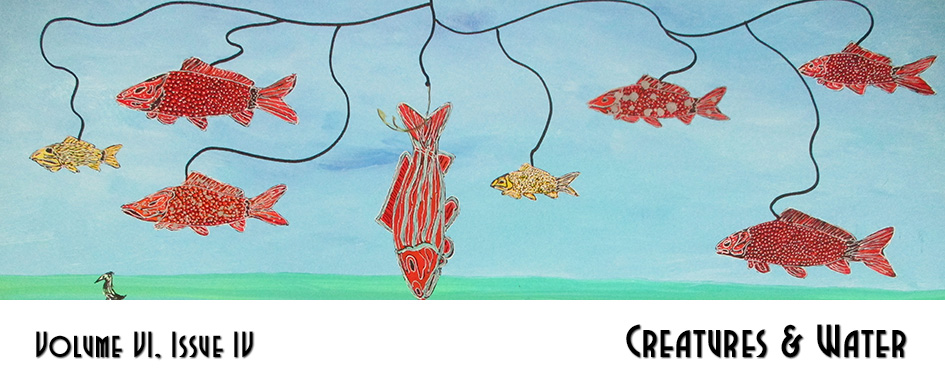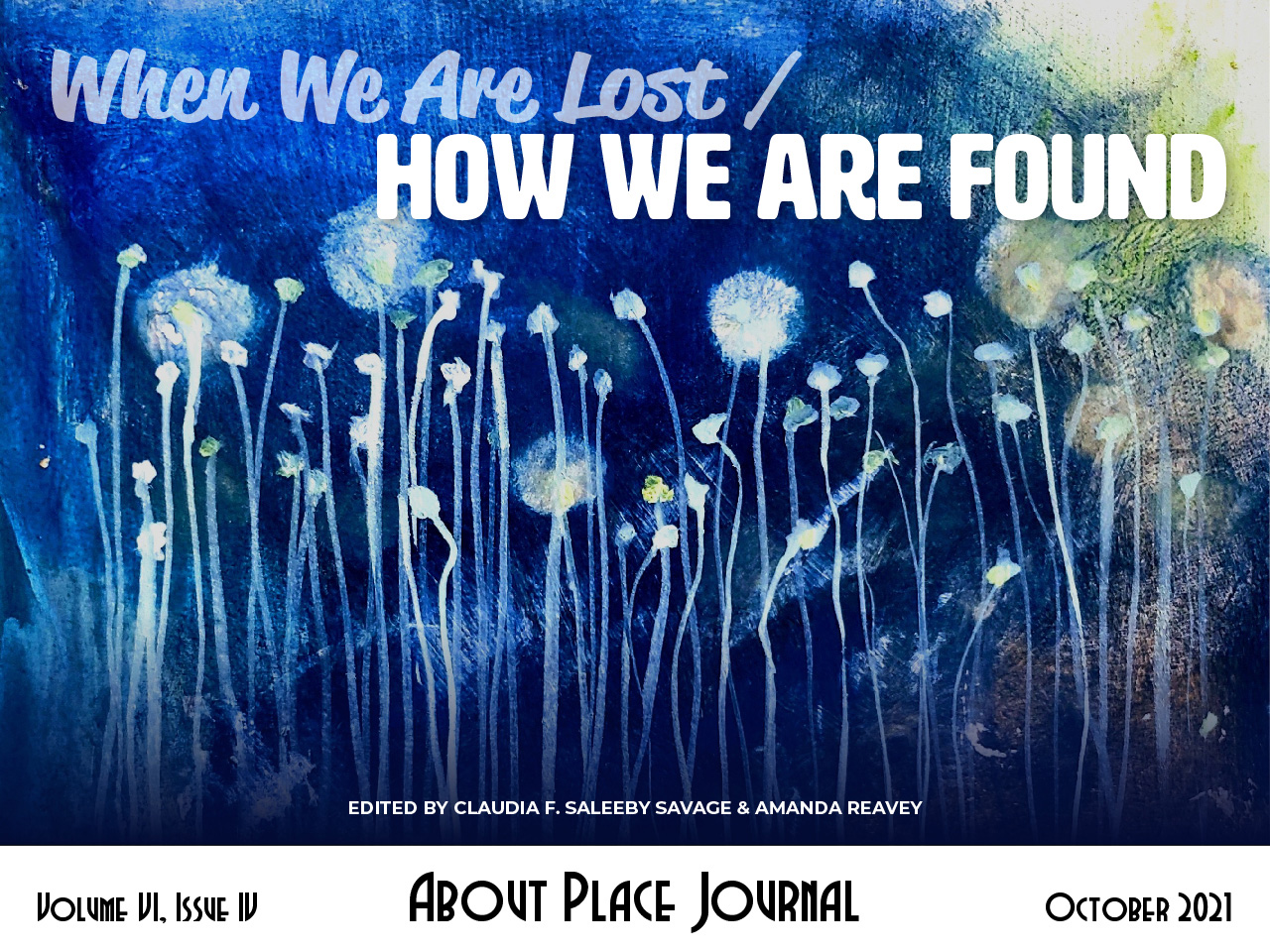My little one, you are no longer so little as you are mine. But you ask about the water on the stove that never stops its simmer, its consummation with the low light flame. There’s a sty on my eye, little one, have you noticed or have you always stopped seeing me, this sister older than you. The soft warm water is there to sit beneath my eye, to raise the undercurrent of pus. It feels bruised, my eye, and the water soothes and agitates. This way too, there is water endlessly for our teacups, so that even though we are sweating, we hold the heat of summer in our hands.
When, for the first time, I finally call our great aunt, it is a hot, dry winter in the Bay. We welcomed winter because we welcomed rain, that steady relief of downpour. When rain did not come, we prayed for it. When it still did not come, we talked of it, as though our conversation would call it into itself, like a friend who has forgotten who they are. But when the little moisture that had been caught in the catchpools, the reservoirs, the small streams that ached to be swollen, when this little began to evaporate, we stopped even speaking of rain. We did not mention our ache for it. We did not mention its absence. We absconded our fear of the drought with our silence.
Little one, do not remember to grow steady in your silence. Remember, for us both, to call back those that you love, with the reminder that you remember.
In March, our great uncle texts me that Aunt Mae is in hospice. Two hours later, he sends another message, that she is gone. I learn, my dearest one, that there’s no keeping a being alive when they know it is their time to leave.
April in Northern California is a calendar of two dates. The state mind declares the end of rainy season; the body that lives begins the fear of fire season. It is in April, the month past Aunt Mae’s passing, that the dead grey whales have begun to wash up on the beaches. One comes where I live, washed ashore sometime when the beach was empty but for the night.
Aunt Mae fell down the stairs in January, After the hospital, she went into a rehab. When she was there, she had a kleenex box Rolodex. It was full of the contacts she would want least to forget. She didn’t know me well enough for my name to be stored in that tabernacle. All I can do is wonder about its print. I make it lime green in my mind, dark leaves on green sky. A print to evoke spring– so that when she clutched the numbers, she held spring close in aging hand. So it was that springtime tumbled from the plastic table by her bed, and so it was a fallen springtime that the nurses walked by and would not pick up, saying it was not their job. So it was springtime that she saw, laying for hours just out of reach of her fingertips and springtime that was restored to her when her husband checked her out early.
Little one, you ask me why the heat stays low on this water. It is like this. If I light the flame of bright and easy anger, the water overflows, too hot, too fierce, it will overflow. There will be no water to soothe my eye, no tea for us to drink together.
When I go to meet our whale, the winter heat has changed, the wind is strong and cutting. Sand is snow in the air. Not seeing anything that might be a whale, I climb the beach’s ledge until a finger points to a mass. It is a small mirror of a seabound rock.
I forget my manners when I finally meet her. That is, I forget my humanity, I forget to remember that she has lived. Now she is mostly molten, melting fat. Her ribs soar above a claw the way my hand used to be, to snatch at your head, little one. Each rib is swollen red. In my closed chest, I thought my heart would ache and keen, but I hear instead steady silence. Blood is pooled in the water there beneath her, a rivulet back into the ocean, bringing to my clueless mind a more gruesome death than her stilled and subtle body suggest.
I see her grill, intact beneath cold flesh, which brings to me the belated recognition of her life, absorbed as I am in the structure of her death. That this warm white spill lived within her, that these black rubber rocks were the lines of her body against the sea. Smaller than I expected, I learn later she is forty one feet long. She is fully grown in size and at three years old, fully young in age.
Our birthdays were in February, little one, and so was Aunt Mae’s. I call and it is the last time we talk, we speak only for a few quick moments. They tell me they are having pizza for dinner. I imagine the slow cool of white cheese, warm rounds of pepperoni. Is this what it is to build a relationship, to share only that you remember the young facts that you may learn? Or is this what it is to speak when one is dying?
I watch the gulls. They are familiar in their boldness, the small squabbles that they share–do you remember how we would fight, little one, back when we both were younger? You would tilt small plastic packets of maple syrup down your glistening face and just to hear the smack of gluttony, I’d hit you. These gulls fight for the habit of it; there is more than enough of her to share. One moment is frightening to me. A bird has discovered a flap in her rubber down by her remnant tail. He tugs. His bill slips. He clamps tighter and tugs again. What was a flap loosens slightly more, he has begun to strip her. To pull her into strips. Her ribs arc up, slicing the sky between the curves. Below, the gulls slice her into the sand.
It is only a few days before Aunt Mae dies that I call again. This bench I sit on is lifted above the beach, on the little lip between the sand and the sharp rise of the hill. I like to watch waves peddle back into themselves. They are the only steady flow of water we are granted. The creeks are dry, the clay soil sucking itself together into hard earth. Uncle Tom says she sleeps, endlessly–I listen to his listening for any sound that may break the pattern of her steady sleep. He says Aunt Mae wakes up with him, comes downstairs and sleeps until he shakes her awake to bring her upstairs where she will go back to sleep.
It takes a week for our whale to collapse fully. The last day I see her, she is not whale anymore. It seems she’s gone almost completely, though so much of her is left. Her grey is washed over and through, she’s the color of the sand, which is the color of winter. Her great ribs, the part of her I am most consistently compelled to see, have fallen, no longer doming her flesh. Even the sea gulls seem to grow tired of her, or maybe her meat has rotted so that they are wary of it– this might be why they gather less, pull less at her flesh, demand the least from her demise. In the twilight everything is tender blue. I walk away from her, tumbled in the rock as she is.
On our last phone call, he says “I think this is the end, honey.” He says “she promised me she would eat some strawberries and milk this morning but she’s gone back to sleep now.” He says “now this is tragic.” I do not know how I feel. He is a stranger, she is a stranger, this strange momentum that I felt to bring myself into their lives, to meet my family, has only brought me, stranger, into this intimate, final moment. And still, my heart does ache, little one.
Somehow, on these last days of her, is a mist, moisture in the air. Later this mist will pound into the earth and we will have a downpour. The creek will rise, the dust will be washed from the leaves. The newts will be able to ford the path because there will be moisture there and they will roll their bodies, their green glass eyes, all over. It falls on her too, like it falls on all of us. This freshwater weeping on the last of her. There’s a cargo ship on the horizon. It’s cold, tomorrow there will be rain.


